Tea is something I drink every single day. It’s sacred at my house – I even have a whole drawer devoted to it! I drink it because it is amazing for your health. There are so many varieties of tea that can improve digestion, metabolism and even prevent certain diseases. This investigation into tea ingredients has been in the making for a long time. What I’m about to share with you totally rocked my world forever and I’ll never look at tea in the same way again. Do you really want to know what’s in your tea?…Then read on.
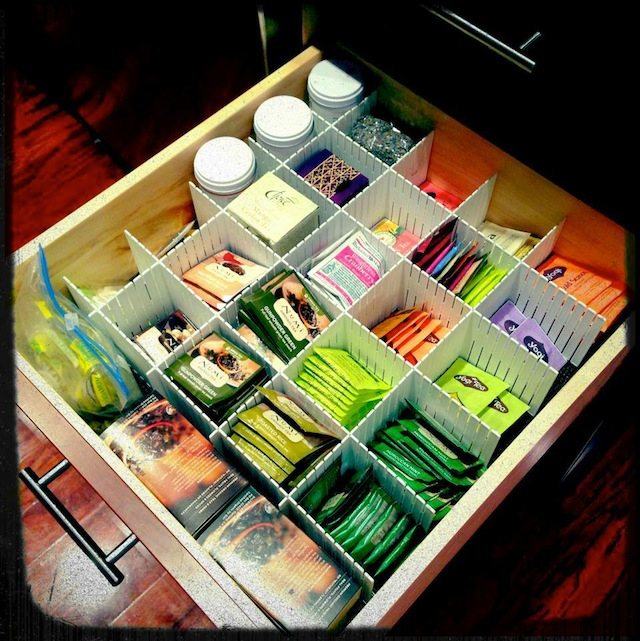 The ancient Chinese tradition of drinking tea dates back thousand of years to the early Chinese dynasties and aristocrats who drank the beverage for its medicinal properties. In ancient times, leaves from the Camellia Sinensis (the tea plant) were either ground into a powder or placed as loose leaves directly into water to infuse it with herbal essence. Unfortunately, modern day tea is nothing like the unadulterated version of old tea. Many of today’s tea brands are operating under the guise of providing health benefits and promoting clean living, but are actually laden with pesticides, toxins, artificial ingredients, added flavors and GMOs.
The ancient Chinese tradition of drinking tea dates back thousand of years to the early Chinese dynasties and aristocrats who drank the beverage for its medicinal properties. In ancient times, leaves from the Camellia Sinensis (the tea plant) were either ground into a powder or placed as loose leaves directly into water to infuse it with herbal essence. Unfortunately, modern day tea is nothing like the unadulterated version of old tea. Many of today’s tea brands are operating under the guise of providing health benefits and promoting clean living, but are actually laden with pesticides, toxins, artificial ingredients, added flavors and GMOs.
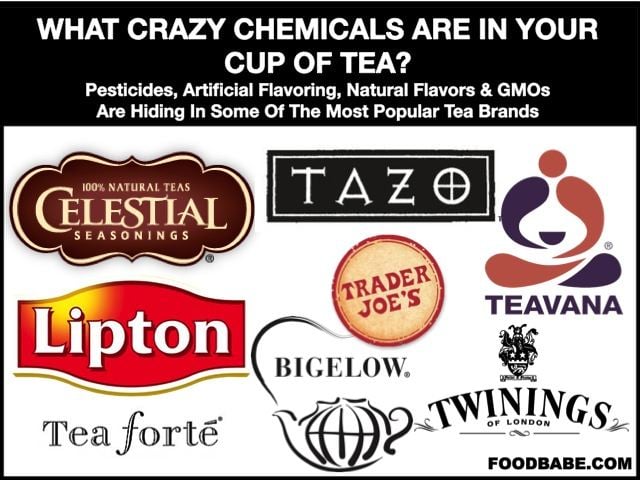
Conventional Teas – An Abundance of Pesticides
Did you know that most tea is not washed before it is put it into bags? That means if the tea was sprayed with cancer-causing pesticides, those pesticides go directly into your cup. And this is the reason why tea is on my organic shopping priority list. To prove this point, here are some shocking facts about one of the most well-known tea brands – Celestial Seasonings.
A recent third-party analysis by Glaucus Research and discussed here found that 91 percent of Celestial Seasonings tea tested had pesticide residues exceeding the U.S. limits. For example, Sleepytime Kids Goodnight Grape Herbal contained 0.26 ppm of propachlor, which is a known carcinogen under California’s Propsition 65.
The “Wellness” tea line was found to contain traces of propargite, also a known carcinogen and developmental toxin. The FDA has already issued two warning letters to Celestial Seasonings in regard to poor quality control according to this source. Imagine what happens when pesticide-laden tea is steeped in boiling water.
If grocery store brands don’t provide a clean option for you, perhaps a high-end loose leaf tea would circumvent some of the issues of grocery store brands. Right? Wrong! Take Teavana, which is found in malls across North America for example. Teavana taps into tea culture with the “Teavana Experience.” Convincing their employees to take customers on a sensory journey – they open a huge canister of loose leaf tea and wave the top of the canister so you can smell the tea – touting all of the wonderful health benefits of tea complete with samples and manipulative demonstrations that end in an expensive visit to the tea shop. Is all the extra money worth it? Are customers getting a superior tea product? No.
Teavana tea was tested by an independent lab and 100 percent of it was found to contain pesticides. One tea in particular, Monkey Picked Oolong, contained 23 pesticides. 77 percent of the teas would fail European Union pesticide import standards, and would be banned from import. 62 percent of the teas tested contained traces of endosulfan, a pesticide that has been banned by the U.S., China, the E.U., and 144 other countries because it has been linked to impaired fertility and could harm unborn babies.
UPDATE (May 27, 2014): Glaucus Research funded the research done by Eurofins Scientific (an independent lab) and admits on their disclaimer that they are biased because they would make money if Hain’s stock declines. However – I am not sure that Eurofins’ research should be completely discounted on this point alone. Since I wrote this post, Celestial has been sued in a class-action lawsuit based on the pesticides that Eurofins found in their teas and for mislabeling of them as “100% Natural”. The jury is still out on whether Eurofins’ research will be considered legit, as this case is still active in California. The Plaintiffs contend that Celestial’s teas contain “pesticides, herbicides, insecticides, carcinogens, and/or developmental toxins (collectively, “Contaminants”)” and Celestial “did not dispute – and has never disputed – that the tea Products contained Contaminants. Nor has (Celestial) challenged the results of the Eurofins Tests” and “has not claimed that Eurofins was biased or that the Eurofins Tests were not, in fact, accurate”. Even if it is determined that Eurofins’ research was not accurate – it’s important to note that Celestial’s tea that was tested is NOT organic and some of this tea is sourced from China. Greenpeace issued a report on the alarming amount of pesticides found on tea from China, followed up by a detailed report on Lipton brand tea from China – in which they recommend only purchasing certified organic tea to avoid these pesticides. Reference law documents: Complaint; Plaintiff’s Memo in Opposition to Motion to Dismiss. Case 8:13-cv-01757-AG-AN
Teas Can Contain Artificial Flavoring, Natural Flavors, and Hidden GMOs
Furthermore, a majority of Teavana teas contain added flavor – specifically “artificial flavoring.” If their tea is so high end, why would they be adding ingredients produced by fractional distillation and chemical manipulation of various chemicals like crude oil or coal tar? Coal tar in my tea? No, thanks.
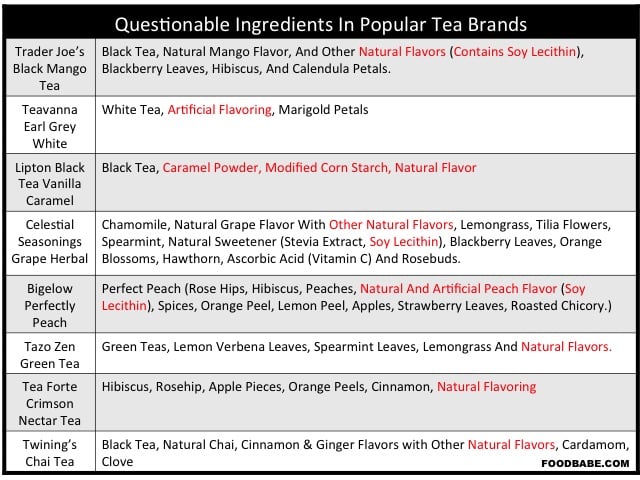
Many popular tea brands get away with using the ingredient “natural flavors” to trick the consumer into thinking they are buying better, cleaner ingredients; however companies are just covering up the inferior taste and low quality of their tea. Fortunately, there are brands that are putting the kibash on the use of natural flavors and using all real ingredients. I was happy to learn that Ahmed Rahim, CEO of Numi Tea is just as disgusted by this ingredient as I am. He said to me “You can breakdown anything that is found in nature and if it ends up tasting like the flavor you wish to use – you can add it to any product and call it NATURAL FLAVOR on the ingredient label. It could come from a stone in the ground and you’d never know.” This is why when I see the words “natural flavor” listed on a label – I put the product down and run far far away. I want to know what I am eating! Don’t you?
Additionally, the added risk of consuming possible GMOs is not something many people think about when consuming teas. Before this investigation and witnessing tea companies using modified corn starch and soy lecithin in tea (additives likely made from genetically engineered corn and soy), I didn’t think about it either! I can’t imagine having a serious soy allergy, considering all the places companies try to hide it.
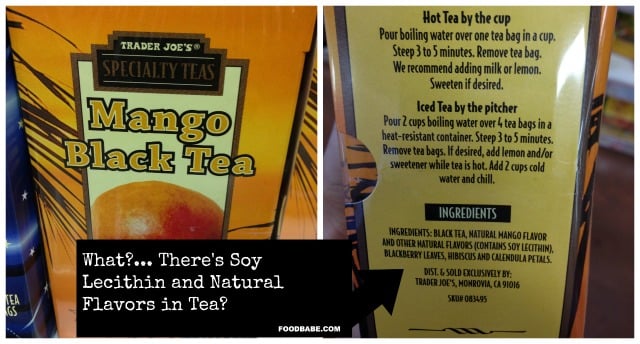
Why The Tea Bag & Packaging Matters
A recent article in The Atlantic discusses the “silky sachet” and “luxurious mesh bags” that hold loose leaf teas (like in brands Tea Forte and Mighty Leaf). Turns out, these modern day bags meant to showcase the tea leaves, are made of plastic.
PLA (polylactic acid) is a (likely GMO) corn-based tea bag material that has attracted major tea companies due to its nice look and its claims of biodegradability. Terms like “silky sachets” and “corn-based biodegradable tea bags” mislead customers into believing a product is more natural and sustainable than it really is. While the processing for PLA removes all traces of genetic material, it is still made with genetically modified corn. Although the actual tea bag is not an ingredient like teas and herbs, it is an element that is put into boiling water.
According to The Atlantic, tea bags are most commonly made from food grade nylon or polyethylene terephthalate (PET) which are two of what’s considered the safest plastics on the scale of harmful leaching potential. However, Dr. Mercola disagrees, he states:
“While these plastics are generally considered among the safest in terms of leaching potential, the molecules in these plastic tea bags may still in fact break down and leach out when steeped in boiling water…” Well, isn’t that how tea is prepared?
Another temperature consumers need to worry about in tea is the “glass transition” temperature. Here’s the science behind the glass transition temperature or, Tg, and why it becomes dangerous according to The Atlantic:
“That is the temperature at which the molecule in certain materials such as polymers begin to break down. As a rule, the Tg of a material is always lower than the melting point. In the case of PET and food grade nylon (either nylon 6 or nylon 6-6), all have a Tg lower than the temperature of boiling water. For example, while the melting point of PET is 482 degrees Fahrenheit, the Tg is about 169 degrees. Both nylons have a lower glass transition temperature than PET. (Remember that water boils at 212 degrees.) This means the molecules that make up these plastic tea bags begin to break down in hot water.”
So, while the plastic itself won’t melt in your tea, the glass transition temperature could potentially leak out harmful phthalates if there are such things in your tea. Another thing to worry about is that some of the newer tea bags are made with a variety of plastics. Some plastics are nylon, some are made of viscose rayon, and others are made of thermoplastic, PVC or polypropylene.
Beware of paper tea bags too, which can be worse than plastic tea bags.
GET THIS: Also according to Dr. Mercola, many “paper tea bags are treated with epichlorohydrin, a compound mainly used in the production of epoxy resins. Considered a potential carcinogen by the National Institute for Occupational Safety and Health2 (NIOSH), epichlorohydrin is also used as a pesticide. When epichlorohydrin comes in contact with water, it hydrolyzes to 3-MCPD, which has been shown to cause cancer in animals. It has also been implicated in infertility (it has a spermatoxic effect in male rats) and suppressed immune function.”
So what do you do the next time you want a cup of tea? Antioxidant rich teas aren’t going to do much to counterbalance the chemicals, additives and artificial flavorings in today’s modern teas.
First, I recommend looking at this chart below to see how your favorite tea brand stacks up:
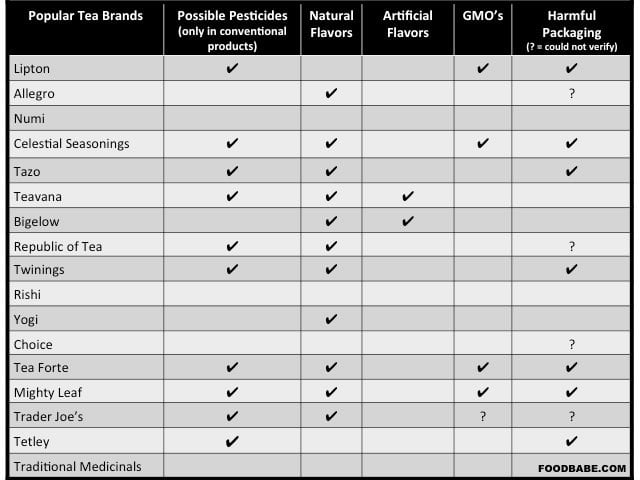
And then when brewing and picking out the safest tea remember these tips:
1. Choose an organic & non-GMO certified brand of tea. (My favorites are Numi, Traditional Medicinals, and Rishi Tea (loose leaf)).
2. Check the ingredient list on the back of the tea package to make sure there are no added flavors, GMO ingredients like soy lecithin and corn starch added to the tea leaves.
3. Make sure the brand you buy uses a safe form of packaging material or buy loose leaf tea and use a stainless steel or glass tea strainer. Have the company verify that bags do not contain epichlorophydrin, and avoid plastic tea bags all together. (Numi and Traditional Medicinals are some of the only brands I trust in this category because they have publicly stated they do not use this harmful ingredient or GMO packaging and are Non-GMO Project verified.)
4. The majority of restaurants use some of the most pesticide ridden tea and brands that have harmful packaging like Celestial Seasonings, Lipton, etc. Don’t fall victim to this. Bring your own tea when eating out or going to restaurants and ask for pot or cup of boiling water (remember to leave a good tip if you do this). I even do this at Starbucks because I like to vote with my dollars and not buy tea brands that are harmful. If you drink iced tea, brew your own at home and carry an insulated water bottle with you.
5. Remember these temps and times for brewing the perfect cup of tea
If you know someone who loves to drink tea, please share this post with them. I was just as shocked as you probably are about all of this craziness – knowing what’s in our tea and what we put in our body matters! Let’s change the world together.
Xo,
Vani


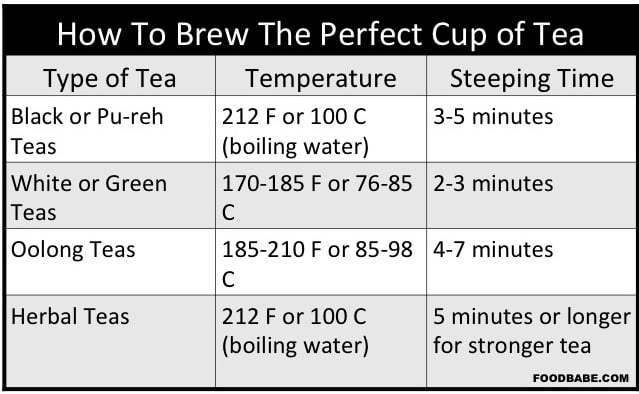

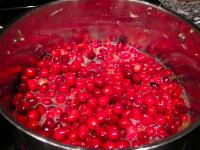
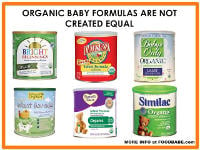
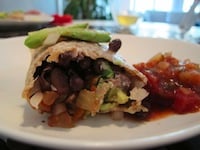


Just wondering if you know about Tiesta teas and their ingredients. I get them at the Tiesta website, but sure would like to hear from you, and anyone who might have insight into this brand!
You know what’s awesome about this article? How the author claims to be “voting with [her] dollars” while she goes to Starbucks. If you really had either two brain cells or two sh*ts to give you’d be patronizing an independent coffee shop. What a joke.
the point she was making was that even at a major chain like starbucks, she brings her own.
what crawled up your ass and died?
oh – furthermore – you assume that independent coffee shops are on every corner.
think again.
some ppl don’t have the luxury of driving halfway across town to Ye Olde Coffee Shoppe on their break.
@trevor: Independent, local coffee shops are not as healthy as they seem. I personally have tried as I am a very picky coffee drinker. I have yet to find that (where I live at least, near a very Big famous university) a local shop that serves organic milk (black tea, latte) or cream. The coffee is hardly ever special and just because they call it ‘responsibly sourced’ or the slogan “Fair Trade” doesn’t really mean anything in terms of trust. For all you know, they could be sourcing from a farm out in Colombia, in which they bribed the officials or worse, the officials pretend to pay farmers “fair” wages. All in all, sometimes shopping at Starbucks is healthier. You can trust that they refrigerate their dairy properly. Not that their milk is organic, it is at least from a trusted source rather than the cheapie hormone/antibiotic laden I have spotted around “local” shops. With that said, in factoring in the Tea, one also needs to look at the water. While boiling the water will kill most biological agents of common concern, it will not always take care of the chemicals or metals in there. To this end, if you do take your own tea bag, make sure they use good water too! And if you do drink black tea, make sure the milk is also of approved high quality.
oh and during the colorado floods, starbucks donated $50,000 to red cross for flood relief. none of the local coffee shops could even try to do that right? it is easy to make corporations always the bad dude, but starbucks treats it’s employees pretty stinking well. from the mouths of the employees i talk too….so yeah…tired comment.
Wow, I had NO idea that they don’t even attempt to wash the tea before they bag it and sell it. That’s just crazy. If they spray it with pesticide they NEED to wash it (I think most people assume they do… again, wow, that they don’t).
I love tea and have well over 20 boxes of different types and am always purchasing more to try. I have a lot of Yogi (that I love) and a few Traditional Medicines (mainly Echinacea types for when me or my husband start feeling under the weather -these along w/ Echinacea pills ensure we never actually get full blown sick) but I also have a lot of Celestial Seasonings. This is such a bummer to find out, but I’m really glad I know this info now… I definitely WON’T be buying any more Celestial Seasonings… and will be on the lookout for that Numi brand. Definitely will be making sure all my tea is organic now… Thanks, Food Babe. 🙂
I am in the same boat, I LOVE tea. I have a box full of tea, and now I find out how gross they are… Sigh* … From now on, I will be looking more into the tea before I buy it. YIKES!!! I cant even imagine how much crap I have consumed over the years. Nasty…
We asked Lipton (and there are others) to confirm the “new” triangular tea bags and what they were made of and they were confirmed as plastic. We complained to Woolworths and why they are selling a product that is obviously carcinogenic when placed with boiling water.
You lose all credibility when you use Dr.Mercola as a refrence to prove a point..He is a well known quack. .You disapoint me every time you do it.
What makes him a quack? Just because someone doesn’t agree with you , you don’t like him? His reports and opinions (studies) are worth just as much as anyone’s
I agree Eric. Not all studies are interchangeable, some are done with scientific rigor while others (Mercola’s) are just a marketing tactic to get people to buy products. I originally wanted to share this post but I can’t get passed all the inaccuracies. It is important to be critical of studies, EVEN if the study agrees with your point of view.
From the amount of comments on this post I’ll assume you like to read..I wouldn’t let this guy give me an asprin. .
http://rationalwiki.org/wiki/Mercola
Bigelow makes a certified organic green tea (in bags)that is available in bulk at BJ’s
Steve, what is BJ? Thank you!
BJs is like Sams and Costco, but you get to use coupons
I would love to see these studies. Without them this is useless. Well written and very persuasive, but without links to this studies it could be 100% fake.
I agree with Brad. Without scientific data published in reputable journals all is here say. While I appreciate this article I need more data to verify that Numi or Traditional Medicinals are ethical and reliable companies as the author seems to believe. I suggest Food Babe to list all her sources and links for future postings. Thank you.
Agreed! I have learned to question all sources of information!
Something tells me you don’t click through the read the studies, because unless you’re a nutritionist or a food scientist you would probably barely understand them; you’re just comforted when you see a link, and you don’t bother to look at it. There were a couple great studies (which I actually did read) about this phenomenon, specifically related to chain emails. If the email has a link, people are more likely to take it seriously and even forward it to friends – but almost no one actually clicks on the link.
click through to read what studies? Although there are links in this article, links to studies have not been provided
How about yogi tea? There’s no other ingredients. Some types are usda organic. Some have just a few organic Ingriedients.
I only drink infusion, infusion from leaves or plants, plants or leaves who are grown by people I know, no pesticide, no additive and pack in kraft.
And that’s make a bring difference in taste and what drinking tea brings to me
Try Paromi Tea.. It’s Organic Full Leaf tea, that is a small company based out of Bethesda Maryland. Trust me, I know the owner and he cares more for his product and the quality of it than most other brands on the market. Try it. You wont be disappointed.
I have worked in the tea industry for 25 years. The sensationalist stories about pesticides in tea that have surfaced in the last few years are not without some truth but perspective and context is required in order to make informed conclusions. Firstly, the majority of pesticides in the referenced studies are not water soluble so even if trace amounts are in the leaf they will not be detected in the brewed tea. Secondly, most organic foods including tea contain pesticides so make sure you are well educated and informed about the National Organic Program before citing organic as the answer. Thirdly, the problem here is lack of regulation and not food safety, if you are genuinely concerned about this and research allowable pesticides as published by the EPA on foods you will be horrified to know what pesticides you will find in the every day foods we all consume – it is primarily because tea is not produced commercially in USA that no appropriate regulations exist – there is no incentive for pesticide companies to pay EPA for appropriate limits to be created. Compare it with the EU where there are over 100 regulated pesticides that are permitted to be used on tea based upon extremely intensive safety studies such that even drinking 50 cups of tea per day would not pose a health risk. The residues found in the self-serving studies referenced in this blog were almost all within EU limits and even those that were not pose no risk to human health based upon the level of residue found. The Tea industry is working globally to reduce agro-chemical use on tea bushes but unfortunately the prevalence of pests worldwide occasionally demands that a pesticide be applied. Alternatively the farmer can watch his livelihood disappear. But in these cases the application is extremely well controlled at origin to ensure the tea when harvested and processed will still meet the strict regulations in force in the country to which the tea is being exported. And don’t forget that the last thing a tea farmer wants to do is apply pesticides, they cost a lot of money both to buy and to apply that the price they get for their tea barely supports. Per my earlier and most critical point the problem here is not food safety but a lack of appropriate regulation in the US compared with other tea consuming countries. I am not aware of anyone who has fallen ill or died as a result of drinking tea but I am abundantly aware of the phenomenal health benefits tea provides along with an unmatched selection of fantastic aromas and tastes over 4,000 years in the making. Do not deny yourself one of life’s simple and affordable pleasures because of sensationalist dialogue that serves little purpose than to scare. Accurate education is a better tool in my opinion to allow consumers to make the right choices about their food.
I like your reasoning and referenced your points in my own entry. For me Food Babe did us a service by raising the question, but clearly her black-or-white thinking, lack of quantifying her point about residues, and lack of substantial citations weakens her argument.
BTW, is it commercially feasible to wash tea leaves after harvest? Doesn’t that make tea? Or lead to molding/rotting of the harvest?
The bad news is that Agro-chemicals are not easily washed away by design, what use is their application if it rains the next day and washes off? The good news is that for the very same reason it is unlikely you will detect any residues in a cup of brewed tea. So in effect the process of brewing tea is itself a cleaning process. And more good news is that the anti-oxidant compounds in tea are extremely water soluble so these are readily detectable in the brew 🙂
Thank you for bringing some common sense to this discussion.
People have been drinking Twining’s tea, for example, for hundreds of years. I’m not worried because they list “other natural ingredients” on their labels.
Speaking of references, why do you say most organic products contain pesticides? I’m an organic farmworker and am familiar with many local organic farms. Please clarify.
Many do- I am allergic to pesticides put on apples- yes the pesticides. I’ve had some apples grown by people who don’t use any pesticides and am fine. But many “organic” orchards are just “low-spray”. Found this out after taking a few delicious bites and breaking out in a rash and itchy mouth and throat. Painful. So, organic doesn’t mean it’s actually pesticide free. Just that it goes by the standards of “low-spray” or use ones that are low enough to fall under organic. But if say if any thing was – completely for example, less than 1, like 0.09%….that’s not nothing.
Thanks Julie for highlighting a rather sweeping generalization I made in haste since I was typing furiously in my anger at the original story. The point I was trying to make is that contrary to many peoples’ understanding “organic” does not mean “pesticide free” since rules for organic production (depending upon regulating body, in this case NOP) do allow for application of certain “approved” pesticides when no alternative means for dealing with a pest problem are effective. Furthermore EPA considers organic food that has less than 5% of the permitted level of a pesticide for conventional food to still be compliant. Nonetheless I should retract “most foods” from my comment since I can only speak without question about tea. But I assume you may also deal with wind-drift contamination on farms in your area whereby it is not uncommon to detect residues at extremely low levels (ppb) which have never been applied to your crop but rather have been applied to crops growing in the vicinity. We have studies showing that on a windy day such a contamination can easily occur over 5 miles….
I appreciate the clarification. Thanks.
Thank you for your informed response. I think articles like this should not be taken as fact without citing credible sources.
Thank you for your response. This article seemed ill-informed and no doubt written for money purposes. And I’m sure it scared a lot of people out of drinking tea (not me, tea is my chocolate!!).
My brother was in the tea industry for many years, high level in a nationally known company and I highly doubt he would let his baby sister drink something that could potentially hurt me!
Hopefully more people read the comment section of this article!
I have a large box of Bigelow Organic Green Tea. The only ingredient listed is organic green tea. Certified organic, gluten free. Am I safe?
You’re perfectly fine no matter which brand of tea you drink.
Many of these brands have been around for generations yet you’ve never heard of anyone getting sick or dying from them, have you?
Interesting to note that the third party “research” that forms the foundation for the whole article is done by an investment research group that excplicitly states that “THEY WILL REALIZE SIGNIFICANT GAINS IN THE EVENT THAT THE PRICE OF [Hain (Celestial Seasonings)] STOCK DECLINES.” That pretty much discredits any “research” they’re doing on this topic, in my opinion.
Are pesticides, etc… a problem in teas? Yes, but probably not anymore than other food and drink.
Absolutely, alluded to this in my previous post. Oh Science!!! Thank you Tea Pot for your logical approach! However, I would like to add that while common sense needs to be applied, as well as scientific research. I liked this article because of the listed pesticides that are still being used in this country, when they have been banned in other countries, including poorer nations. Scientific studies have recognized the harmful nature of these. The bigger issue is indeed that companies are being allowed to poison us.
@ food babe. I’d be very interested in the scientific evidence that you mention the pesticides cause infertility and developmental issues. Please share the science with us. By the way I don’t really see your logic regarding the Tg temperature. As Tea Pot pointed out, not every chemical is water soluble. Please if possible clarify or post scientific references. By scientific I mean peer published international journal of high repute.
Do you know anything about the brand The Republic of tea. It says natural flavors, so that is not very good, but otherwise it seems to have minimal ingredients and claims natural unbleached tea bags.
Do ‘nt eat and drink and You will die for sure!
Have there been any studies on popular import brands used predominantly by immigrants? Brands such as AlWazah, Danedar, Ahmed, etc.? My husband drinks a ton of tea & companies like these usually don’t have an “organic” label.
I took a look at some of brands i have in my cabinet and looks like i would have to throw some of them away. Not only I have some of those brands are bad for you but some of are are out of date as well. lol.
My Question is would make a difference if people are encourage to purchase tea infusers instead of using the the provided “TEA BAG” that comes with the tea.?
It is the same concept of cigarettes!!!!!! It Isn’t the tobacco that cause the Lung, heart and throat cancers it is the paper and the filters and ink from the logos on the damn things. It still surprises me that majority of the people around me that are still not getting the concept that our bodies ARE NOT designed to ingest plastic and paper.
Which is why pipe smokers don’t get lung, heart, or throat cancer.
Oh, wait…
-chuckle- Loose leaf teas are more flavorful, generally. The tea bags don’t affect anything unless they are made from bleached paper (coffee filters as well) but if you’re going with loose leaf, please for the love of god use a metal tea ball (strainer) not a plastic one.
Lol wow, the point is why should you have to give up the simple pleasures in life. I understand the journalist is trying to point out the dangers of certain products but It just seems like an “idiot’s guide on reading labels.” If you honestly have no idea what you are eating and drinking maybe you shouldn’t consume it. Come on people use your brains.
If you want to have some nicotine to calm your self down from stress, then smoke. If you want to have a beer to relax from working a 12 hr. shift, Drink up. If you want to have a spot of tea and a crumpet because it is “tea time,” have at it. I get frustrated sometimes with people like this who have to get on the band wagon of “don’t do this, it’s bad for ya!”
You’re sort of right, but it’s actually all the chemicals in cigarettes that do most of the damage, not the paper. The paper and ink are the least of their worries.
What do you think of yogi kava stress relief tea, food babe? Not all of the ingredients are organic, but some are. Should they all be organic for it to be a safe tea?
Lipton Loose Tea seems alright…
only ingredient is Orange Pekoe Black Tea
http://goo.gl/f65qh0
I’ve been drinking tea since I was a kid and have found that some teas made me feel ill or had a ‘greasy’ taste. Peppermint, for example… it’s supposed to settle your tum and I always found it caused me heartburn afterwards. Little did I suspect that the likely causes were artificial flavours and other fillers. When I tried Steeped Tea’s Peppy Peppermint I was thrilled when it actually worked, no ‘kick back’ and tasted amazing! If nothing else, this article highlights the importance of reading ingredient labels and when you want to consume a product to support good health, that we ensure we’re purchasing from consciencious companies that strive to offer the best quality possible. Happy sipping!
If you like Peppermint tea, check out Aveda (hair salon) tea. It’s the best stuff EVER!!!
Food babe, you’re smoking hot, thanks for the info
Can someone tell me about earl grey cream and Buckingham palace garden party tea from the English tea store? There is nothing on the packages.
Upon the first reading, I was truly shocked. Yogi tea is my favorite brand and I currently have some 12 different varieties. However, upon reading Tea Pot’s message, I had to think.
First, Yogi Tea is listed as carrying toxic pesticides, “in conventional products”. As far as I know, YT only makes herbal teas, so what does conventional mean?
Secondly, even a decade ago, fish taken from under the polar ice cap contain pesticide residues. Such residues have circulated and reached the furthest ends of the earth. So the serious question is, what amount of residue is found in YT? As Tea Pot points out, health risks are dependent on the amount of contamination. Avoiding all residues is no longer possible on planet Earth.
Thirdly, I am not happy about YT using “natural flavors”. I don’t understand their need for it. So I will ask them. But in the meantime, FoodB is not asserting which type of natural flavors are used in each row of her chart. So I am undecided on the significance of the ‘tick’ next to YT.
Fourthly, I cannot imagine tea companies washing tea. Doesn’t dipping harvested leaves in water start the tea-beverage process? How hard is it to take mounds of soggy tea leaves and dry them before a mold or other rotting process starts? Is her objection realistic?
Still, I appreciate her research, and will be more careful in the brands I purchase in the future. Luckily I can get Numi and Traditional Medicine locally.
Did not see Red Rose tea on that list.
What about Tazo Organic tea?? or Equal Exchange teas??
Hi, thanks for enlightening us – it’s too bad that so many companies use deceit and trickery to fool us into thinking we’re doing something good for ourselves when buying their products.
I drink a lot of tea because I enjoy it and also because it’s so good for you, but I’ll be more careful now when I make my purchases.
Thank you again!
Ted
For those Chai Tea lovers, try buying your own spices and make your own chai. It’s so much better for you and tasting. I use a recipe that I modify a bit from Eat, Taste, Heal and I love it! I buy loose Frontier brand spices from Whole Foods.
I only buy from Zhena’s gypsy tea. Organic and fair trade. She does not use ANY artificial ingredients and has addressed the issue in newsletters warning tea drinkers of the hazards of artificial tea. I also only buy loose leaf, because it’s better tea, it’s more economical and because I don’t trust tea bags. Keep it simple and you will avoid a lot of crap.
I have about 10 boxes of tea bags from Yogi and Celestial Seasonings. Should I throw them out? I hate to be so wasteful.
I am not criticizing or bashing or anything. Simple, honest question. Where does this information come from?
Yes, it will be good to have the “independant studies” referenced if not with links, then at least with syfficient information, so people who would like to look in to the “dark world” of teas deeper can do so!
What about STASH teas? They only have one or two ingredients listed such as peppermint leaves?
Have you had occassion to test teas that are delivered via the Keurig/K cup system? Just curious. Thanks.
I’m curious about the Republic of Tea. Were they part of your research?
Does Lousiana tea., bad also. Does it have all the poisonsins, in it? It dosen’t seem too be on the list.
My yogi tea all of the ingredients listed are organic… Why are they on the list for having pesticides. Maybe I just don’t understand…??
Two of my favorite tea sources are Equal Exchange and Frontier Natural Foods. Equal Exchange is all organic and fair-trade certified and has dozens of amazing teas. Frontier Natural Foods has numerous organic and fair-trade teas available in bulk which is both more ecological and economical. Also, they are both cooperative businesses and support small farmers around the world in addition to lacking the pesticide residues and questionable additives in question here!
I like the thougt-provoking theme of this article. It made me read the ingredients in the current Tea Forte (Noir flavors) that I received as a gift. the teas are loose, organic and fair trade, so I find it hard to believe there are GMOs and pesticides in them. Can Food Babe please provide the research data showing Tea Forte contains pesticides, GMOs, and harmful packagaing? It’s possible that this only pertains to certain types of tea that Tea Forte makes, and defaming this company over limited (and uncited) results is not helpful to the overall tea-drinking community.
I drink mostly green tea… both hot and the Turkey Hill green tea. I was wondering if the Turkey Hill brand has pesticides in it. I sure hope not as I drink it year round.
I drink tea everyday and have for a number of years, I purchase my tea from Amanzi Tea, which is not listed in your chart – I’m wondering what I need to do to find out if they are organic – can you assist me in finding out?
How about K cups? Is that bad too.
R S
Anybody who gathers their own herbs to make tea knows that any packaged teas do not taste close to the real stuff. I come from Europe and the first time I tasted Celestial seasoning tea I had no idea what I was drinking as it was so filled artificial flavors. It tasted like a bad candy to me. The price you pay for these boxes of tea is astronomical as well as the ongoing packaging to package only a hand full of pulverized debris of tea that has a shelf life of 3 months if even that. If you are a big tea drinker and you want the benefits of tea you may do yourself a big saving by getting things in bulk and have less garbage of packaging.
My tea is 100% organic but not on the list. You can find it at livelife2.organogold.com
what about wissotsky tea? i have a bunch of different kinds of wissotsky!
I contacted Stash and here is what they said:
Hello Chris,
The filter paper used for Stash Teas is made from 100% cellulose fibers (wood) and is made to appear white by forcing air between the fibers. No bleach is used.
Our filter paper suppliers confirmed that the filter paper that they supply us is not coated with epichlorohydrin and does not contain any free epichlorohydrin.
The teabags do not contain any glue and they are also gluten free.
Please let me know if I can be of further assistance.
Thank you for your interest in Stash Tea.
…looks like they are also a good source for tea!!
does anyone know about the wissotsky line of teas?
I was also wondering if you had any information on Art of Tea?
Just read your article on tea which I drink everyday and am very concerned. Do you know if this tea, Guayaki Brand, Yerba Mate, Greener Green Tea is ok? Their website is: http://www.guayaki.com. I am so concerned about all the food fraud in this country and it’s getting worse. I have many food allergies and to the point of growing my own food to know what I’m getting. I love how you are imforming consumers of potential food threats, thank you. We need more people like you who really care.
There is a lot of misinformation in this article – I own a tea business and deal with a lot of great producers who care about the products they import. We post a quality statement on our teas – because we have close relationships and want to know as much as possible about our teas. Buy from a good vendor and take the fear statements with a grain of salt.
http://www.thewhistlingkettle.com/blog/quality-control-statement-tea/
I seriously wondered about this report and so wrote to Celestial Seasonings and this is what they replied. It is VERY important for people to check things out and not believe everything that they read. Who is right on this? I don’t know for sure but there is more research to be done.
Dear Ms. Baker,
Thank you for taking the time to contact us regarding our Celestial Seasonings® Teas.
Celestial Seasonings® strongly disagrees with the misleading statements contained within the report. The report was issued in February, 2013 by a “short seller,” an investment firm which stands to gain financially if our parent company’s stock price declines. By its nature, this kind of firm is motivated to spread false, incomplete and out-of-context information.
Providing safe products has been our top priority for more than 40 years. So when we saw the report, we reacted immediately. We sent the same teas highlighted in the report for testing to the National Food Lab (NFL), an accredited industry-leading third-party lab with decades of experience designing and executing food safety programs. NFL’s independent testing reaffirmed that Celestial Seasonings® teas are safe and follow strict industry guidelines. In addition, NFL detected no pesticides in the brewed Celestial Seasonings teas they tested.
Celestial Seasonings® follows a stringent testing protocol for all incoming raw ingredients. We test for commonly used pesticides, herbicides and insecticides, and we reject ingredients when these substances are detected beyond acceptable limits.
We are confident that all Celestial Seasonings® are safe and in no way “dangerous” as the short-seller’s report concluded.
Thank you for your continued support. If we can be of further assistance, please feel free to contact us at 1-800-434-4246, Monday through Friday from 9AM – 7PM Eastern Time.
Sincerely,
Veronica
Customer Care Representative